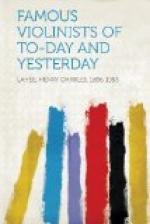Ludwig Norman died in 1885, and three years later Madame Norman-Neruda married the pianist, Charles Halle, who had long been identified with all that was best musically in England, and who was knighted in recognition of his services to the cause of art.
Sir Charles Halle established a series of orchestral concerts at Manchester in 1857, and by means of these concerts brought before the English public the works of many composers who would have remained unknown perhaps for years but for his efforts. In this work he was ably supported by this talented violinist, afterwards his wife, and with her he made many tours all over the British Isles.
In 1890 Sir Charles and Lady Halle made a tour in Australia, which was highly successful. Five years later they went to South Africa, where they met with a flattering reception. In his memoirs, Sir Charles Halle tells of a curious compliment which they received at Pietermaritzburg. The mayor invited them to play at a municipal concert to be given one Sunday afternoon. The concert began, and after an organ solo and a song had been given by other musicians, they played the Kreutzer sonata. At the conclusion of the sonata, a member of the corporation came forward, and said that after the impression just received he thought it would be best to omit the remainder of the programme, upon which the audience cheered and dispersed.
In 1895, shortly after their return from the South African tour, Sir Charles Halle died, and Lady Halle went into retirement. At this time her numerous admirers in England presented her with a valuable testimonial of their appreciation.
Throughout her career she has fulfilled the prophecies made of her in her youth, for her talent and musicianship developed as she grew up, and her genius did not burn itself out as that of many infant prodigies has done. She has never endeavoured to secure public applause at the expense of her real artistic nature. Her performances are and always have been synonymous with all that is good in musical art, and nothing but that which is of the best has ever been allowed to appear upon her programmes.
She is celebrated no less as a quartet player than as a soloist, and was for many years first violin of the Philharmonic Quartet in London.
In 1898, Lady Halle had the misfortune to lose her son, Mr. Norman Neruda, who, while scaling a difficult place in the Alps, slipped and was killed.
In the following year she emerged from her retirement and visited the United States, where her playing was highly appreciated by unbiassed critics. There was a feeling, however, that she might have made the journey many years before, and allowed the American public to hear her in her prime, when she would have received not only a very warm welcome, but would have been judged rather by her merits than by her history, and she would not have challenged comparison with the violinists of the rising generation.




